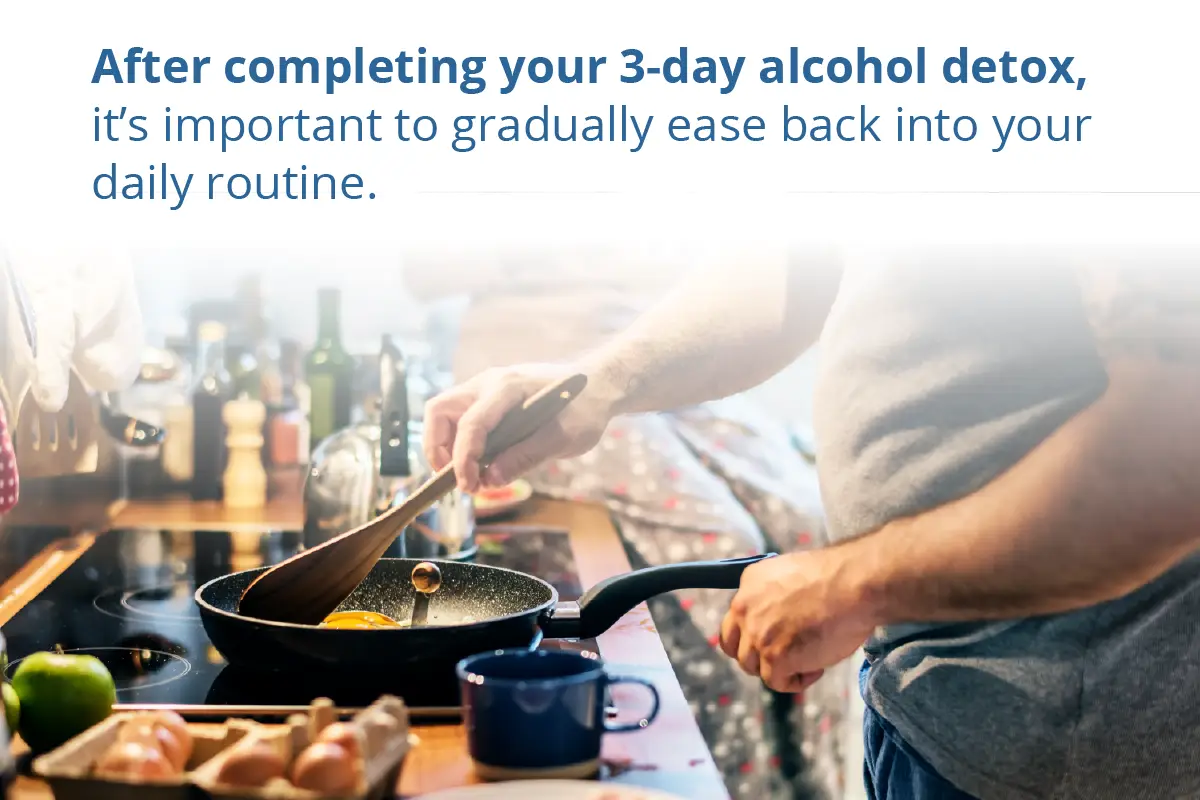
A 3-day alcohol detox is a short-term program designed to help individuals stop drinking alcohol and begin recovery. Over three days, participants undergo a process to clear alcohol from their system and manage harmful withdrawal symptoms. It can be done at home or in a detox facility, depending on the individual’s needs and severity of alcohol consumption.
Many people consider a 3-day alcohol detoxification to kick-start their recovery from alcohol abuse and addiction. It can be a good option for those looking for a quick, manageable way to reduce their alcohol intake. This detox can be less overwhelming than longer programs, making it a popular choice for those new to recovery or with busy schedules.
The potential benefits of 3-day alcohol detox programs include improved physical health, such as better sleep and increased energy levels. It can also improve mental clarity and lessen alcohol cravings. In addition, this type of detox can provide a sense of accomplishment and motivation to continue with further substance abuse treatment or lifestyle changes.
A 3-day alcohol detox is a short-term plan to help remove alcohol from your system and start addiction recovery. Here is what you need to know:
Starting a 3-day alcohol detox requires careful preparation to ensure a smooth and effective experience. Here’s how to prepare for this detox process effectively.
On the first day of your detox, you might experience a mix of physical and mental changes. Common symptoms include headaches, nausea, and fatigue. These are normal reactions as your body starts to adjust to the absence of alcohol. Remember to stay positive and keep focused on your goal.
To ease the alcohol detox process, keep yourself busy with gentle activities. Light exercise, like walking or stretching, can help improve your mood and energy levels. Try to engage in relaxing activities such as reading or listening to soothing music to keep yourself calm and distracted.
Eating a balanced diet is crucial during detox. Focus on consuming whole foods like fresh fruits, vegetables, and lean proteins. Avoid sugary and processed foods, as they can make alcohol withdrawal symptoms worse. Drinking plenty of water will also help flush out toxins from your system.
By the second day of alcohol detox, you might notice more pronounced symptoms, such as mood swings or anxiety. These changes are part of the detox process as your body continues to adapt. It’s important to acknowledge these feelings and remind yourself that they will pass.
Hydration is vital to managing alcohol detox symptoms. Drink water throughout the day to help reduce headaches and fatigue. Herbal teas can also be soothing and help with relaxation. Refrain from caffeine and alcoholic drinks, as they can worsen dehydration and withdrawal symptoms.
Cravings for alcohol can be strong on the second day of detox. Distract yourself with hobbies or call a supportive friend to talk. Deep breathing exercises and mindfulness meditation can aid in managing the urge to drink. Remember, cravings are temporary and will diminish over time.
On the final day of your detox, you may start to feel more like yourself. Symptoms should be less intense, and you might notice improvements in mood and energy levels. Celebrate these positive changes, as they are indicators that your body is healing and adjusting well.
Keep yourself motivated by focusing on the benefits of completing the detox. Remind yourself of your goals and the positive changes you’re experiencing. Writing down your reasons for starting the detox can help strengthen your commitment and keep you focused on your recovery.
On day 3, take time to reflect on your detox journey. Consider what you’ve learned about yourself and the process. Acknowledge your efforts and think about your next steps. Use this reflection to build a plan for continuing your recovery and maintaining a healthier lifestyle.
After completing your 3-day alcohol detox, it’s important to gradually ease back into your daily routine. Start by reintroducing regular activities slowly, without overwhelming yourself. Focus on maintaining a balanced schedule that includes time for rest, work, and leisure. This gradual approach assists your body in adjusting to its new, alcohol-free state and supports your overall well-being.
Ongoing support is crucial for maintaining your progress after detox. Connect with local support groups like Alcoholics Anonymous (AA), counselors, or therapists who can provide guidance and encouragement. Sharing your experiences with others who understand can be very helpful. Regular check-ins with a healthcare professional can also ensure you stay on track and address any challenges you might face.
To build on the success of your detox, consider making long-term lifestyle changes. Focus on healthy habits like eating nutritious foods, exercising regularly, and managing stress effectively. Avoid places or situations that may trigger cravings or temptations. By incorporating these positive changes into your daily life, you set a strong foundation for long-term recovery and improved health.
By following these post-detox recommendations, you set yourself up for continued success and continue moving toward a happier, healthier, alcohol-free life.
A 3-day alcohol detox program may not be suitable for everyone. Let’s identify who should consider other detox methods to ensure safety and effectiveness:
By understanding these limitations, you can make a well-informed decision and ensure a safer and more effective alcohol detoxification experience.
Navigating the journey to recovery can bring up many questions. Below are some of the most commonly asked questions about our services. If you need more information or have additional questions, we are only a phone call away.
What happens on day 3 of detox?
On day 3 of detox, withdrawal symptoms often peak, causing increased discomfort. You might experience intense cravings, fatigue, headaches, or mood swings. Your body is working hard to rid itself of toxins, which can make you feel unwell. It’s crucial to stay hydrated, eat nutritious foods, and get plenty of rest. Support from healthcare professionals and loved ones can help manage symptoms and keep you motivated. Remember, this challenging phase is a sign of progress towards recovery.
What does life look like after rehab?
After rehab, life can be both hopeful and challenging. You’ll start rebuilding daily routines, focusing on maintaining sobriety and managing triggers. Support from behavioral therapy, support groups, and loved ones is vital for ongoing recovery. It’s essential to set realistic goals, stay active, and develop healthy habits. Relationships and work life might need adjustment, but with perseverance and support, you can lead a fulfilling and balanced life. Embrace this new chapter with patience and a positive outlook.
Are there any risks or side effects associated with a short-term alcohol detox?
Short-term alcohol detox can have risks and side effects, including anxiety, irritability, headaches, and insomnia. In some cases, withdrawal symptoms like anxiety, sweating, nausea, or tremors may occur. For heavy drinkers, there’s a risk of more severe complications like delirium tremens or seizures. It’s essential to detox under medical supervision to manage these risks safely and effectively. Professionals can provide support and medication to ease symptoms and ensure a smoother detox process.






How Long Alcohol Stays in Your System If you’re wondering how long alcohol stays in


Alcohol Poisoning: Stay Informed, Stay Safe Other Categories Mental Health Treatment Alcohol Use Recovery In

Massachusetts offers many enjoyable, alcohol-free activities for you to partake in. From the serene beauty

Are you looking to cut back on excessive drinking and take control of your health?

Proper nutrition is crucial when detoxing from alcohol and drugs. During detoxification, the body eliminates






Wellbutrin is an atypical antidepressant drug that can be extremely beneficial for individuals battling seasonal





If you’re even a ‘casual’ drinker, there’s a good chance you’ve experienced some alcohol withdrawal
Let’s talk about what’s going on — no judgment. (We’ve been there before ourselves). No one will know you inquired and there is no commitment to call.
Need someone to talk to? We’re here when you need it most.
There’s no obligation to get your questions answered.
No one will ever know you inquired.
3161 S Prosperous Pl. Green Valley, AZ 85614
5201 Stagecoach Rd, Little Rock, AR 72204
The Haven Detox - West Memphis
410 South Avalon St. West Memphis, AR 72301
The Haven Detox - Florida Alcohol & Drug Rehab
1325 N Haverhill Rd West Palm Beach, FL 33417
1369 Grafton St Worcester, MA 01604
6 Collier Dr Blackwood, NJ 08012
Copyright © 2025 The Haven Detox. All rights reserved.
Privacy Policy · Blog